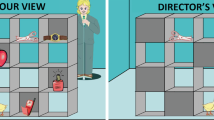We examined different cognitive phenomena in relation to social phobia among children (aged 7 to 11) and adolescents (aged 12–16) separately. Fifty socially phobic youths were compared to 30 normal control children on measures of social anxiety, social expectation as well as self- and observer-rated performance during two social tasks involving a same-aged peer. Additionally, a video-mediated recall procedure was conducted immediately following the two behavioral tasks to examine specific types of self-talk. Results indicated that socially phobic youths had lower expectations of their performance and rated their actual performance worse than controls during a social interaction task, but not a read-aloud task. Self-ratings of decreased performance among socially phobic youths were corroborated by blind observers. Although differences in specific types of self-talk were found between the two groups, these findings were generally moderated by age. Furthermore, certain cognitive symptoms associated with the disorder were more commonly found among older socially phobic youths. The current findings highlight the importance of considering developmental factors in the presentation and treatment of social phobia in youths.
Similar content being viewed by others
REFERENCES
Alden, L. E., & Wallace, S. T. (1995). Social phobia and social appraisal in successful and unsuccessful social interactions. Behaviour Research and Therapy, 33, 497–505.
Alfano, C. A., Beidel, D. C., & Turner, S. M. (2002). Cognition in childhood anxiety: Conceptual methodological and developmental issues. Clinical Psychology Review, 22, 1209–1238.
Banjeree, R., & Henderson, L. (2001). Social-cognitive factors in childhood social anxiety: A preliminary investigation. Social Development, 10, 558–572.
Beidel, D. C. (1991). Social phobia and overanxious disorder in school-aged children. Journal of the American Academy of Child and Adolescent Psychiatry, 30, 545–552.
Beidel, D. C., Turner, S. M., & Dancu, C. V. (1985). Physiological, cognitive and behavioral aspects of social anxiety. Behaviour Research and Therapy, 23, 109–117.
Beidel, D. C., Turner, S. M., Hamlin, K., & Morris, T. L. (2000). The Social Phobia and Anxiety Inventory for Children (SPAI-C): External and discriminative validity. Behavior Therapy, 31, 75–87.
Beidel, D. C., Turner, S. M., & Morris, T. L. (1995). A new inventory to assess childhood social anxiety and phobia: The Social Phobia and Anxiety Inventory for Children (SPAI-C). Psychological Assessment, 7, 73–79.
Beidel, D. C., Turner, S. M., & Morris, T. L. (1999). Psychopathology of childhood social phobia. Journal of the American Academy of Child and Adolescent Psychiatry, 38, 643–650.
Beidel, D. C., Turner, S. M., & Morris, T. L. (2000). Behavioral treatment of childhood social phobia. Journal of Consulting and Clinical Psychology, 68, 1072–1080.
Bogels, S. M., & Zigterman, D. (2000). Dysfunctional cognitions in children with social phobia, separation anxiety disorder, and generalized anxiety disorder. Journal of Abnormal Child Psychology, 28, 205–211.
Cartwright-Hatton, S., Hodges, L., & Porter, J. (2003). Social anxiety in childhood: The relationship with self and observer rated social skills. Journal of Child Psychology and Psychiatry, 44, 737–742.
Chansky, T. E., & Kendall, P. C. (1997). Social expectancies and self-perceptions in anxiety-disordered children. Journal of Anxiety Disorders, 11, 347–363.
Clark, D. M., & Wells, A. (1995). Cognitive therapy for anxiety disorders. In L. J. Dickstein & M. B. Riba (Eds.), Review of psychiatry. Washington, DC: American Psychiatric Press .
Foa, E. B., Franklin, M. E., & Perry, K. J. (1996). Cognitive biases in generalized social phobia. Journal of Abnormal Psychology, 105, 433–439.
Ginsburg, G. S., La Greca, A. M., & Silverman, W. K. (1998). Social anxiety in children with anxiety disorders: Relation with social and emotional functioning. Journal of Abnormal Child Psychology, 26, 175–185.
Kendall, P. C., & Chansky, T. E. (1991). Considering cognition in anxiety-disordered children. Journal of Anxiety Disorders, 5, 167–185.
Lodge, J., Tripp, G., & Harte, D. K. (2000). Think-aloud, thought-listing, and video-mediated recall procedures in the assessment of children's self-talk. Cognitive Therapy and Research, 24, 399–418.
Morris, T. L., Hirshfeld-Becker, D. R., Henin, A., & Storch, E. A. (2004). Developmentally sensitive assessment of social anxiety. Cognitive and Behavioral Practice, 11, 13–28.
Morris, T. L., & Masia, C. L. (1998). Psychometric evaluation of the social phobia and anxiety inventory for children: Concurrent validity and normative data. Journal of Clinical Child Psychology, 27, 452–458.
Poulton, R., Trainor, P., Stanton, W., McGee, R., Davies, S., & Silva, P. (1997). The (in)stability of adolescent fears. Behaviour Research and Therapy, 35, 159–163.
Rapee, R. M., & Lim, L. (1992). Discrepancy between self- and observer ratings of performance in social phobics. Journal of Abnormal Psychology, 101, 728–731.
Silverman, W. K., & Albano, A. M. (1996). The Anxiety Disorders Interview Schedule for Children-IV (Child and Parent Versions). San Antonio, Texas; Psychological Corporation.
Southam-Gerow, M. A., & Kendall, P. C. (2000). A preliminary study of emotion understanding of youths referred for treatment of anxiety disorders. Journal of Clinical Child Psychology, 29, 319–327.
Spence, S. H., Donovan, C., & Brechman-Toussaint, M. (1999). Social skills, social outcomes, and cognitive features of childhood social phobia. Journal of Abnormal Psychology, 108, 211–221.
Wallace, S. T., & Alden, L. E. (1997). Social phobia and positive social events: The price of success. Journal of Abnormal Psychology, 106, 416–424.
ACKNOWLEDGMENT
This manuscript was supported in part by NIMH Grants 53703 and 60332 awarded to the second and third authors.
Author information
Authors and Affiliations
Corresponding author
Rights and permissions
About this article
Cite this article
Alfano, C.A., Beidel, D.C. & Turner, S.M. Cognitive Correlates of Social Phobia Among Children and Adolescents. J Abnorm Child Psychol 34, 182–194 (2006). https://doi.org/10.1007/s10802-005-9012-9
Received:
Revised:
Accepted:
Published:
Issue Date:
DOI: https://doi.org/10.1007/s10802-005-9012-9




